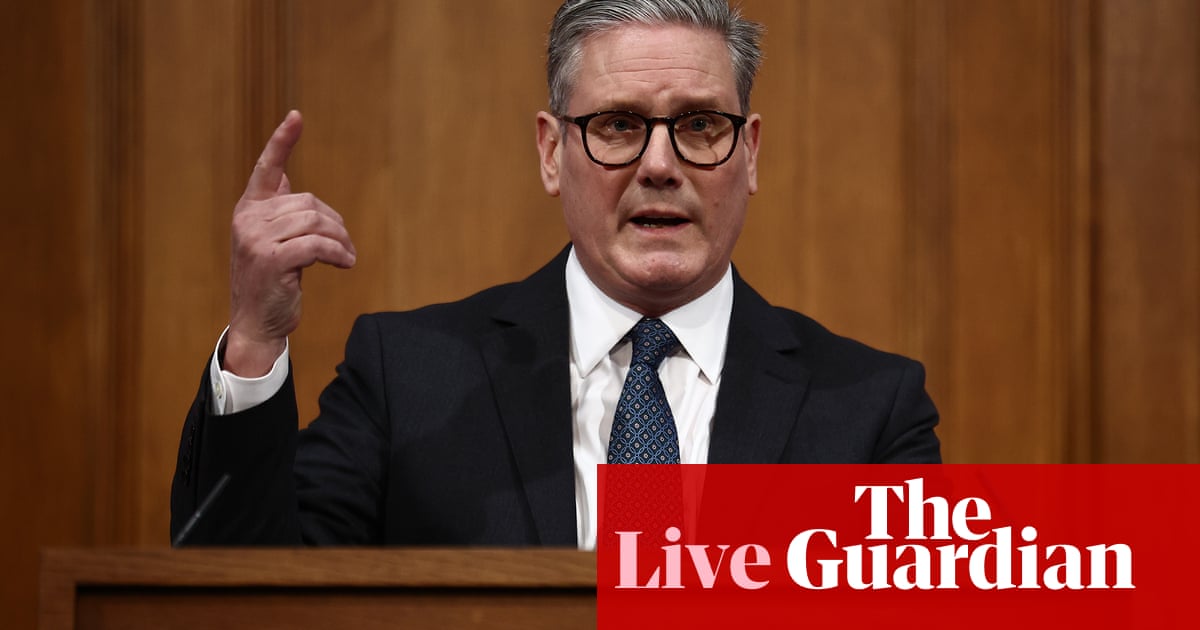Starmer’s Southport attack statement and Q&A – snap verdict
Prime ministers are often at their best when they are dealing with a subject they know from their old job and, from what Keir Starmer was saying at his press conference this morning, it sounds as if he spent part of last summer acting as if he were back at the CPS – getting regular updates from the police about their investigation, and having to judge what could and could not be said in the light of the need not to jeopardise a future court case. He is not given to excessive displays of emotion, but he did a good job at channelling the horror that people felt about the attacks, and he fully accepted that, by not stopping Axel Rudakubana, the state failed. There was nothing in what he said to suggest that the inquiry will be any sort of whitewash. Starmer sounded like someone happy for it to be as damning as it needs to be.
His main argument was also informed by his background as DPP (where he will have spent a lot of time dealing with decisions about when terrorism charges were and were not justified). And the argument was: that terrorism law, and strategy, needs to change to deal with people like Rudakubana who act like terrorists, because they are obsessed with extreme violence, but who don’t have terrorist motives, and aren’t under terrorist line management. (See 8.36am, 8.45am, 9.13am and 9.21am.) Again, on this he was compelling – talking seriously, in detail, about a subject to which he has clearly given much thought.
Starmer did not say in detail what he would do to address this, but he clearly wants an overhaul of counter-terrorism strategy, and he hinted terrorism law might need to change too. More intriguingly, he also implied he would like to see greater restrictions on what can be published on line – but in terms of material that might prejudice a court case (see 8.59am) and violent material generally (see 9.21am). This could lead to conflict with Donald Trump’s favourite US tech baron, Elon Musk, whose X social media platform was one of the worst offenders for prejudicial content after the Southport murders.
Starmer also sought to refute the claims that he was engaged in some sort of cover-up last summer. He explained the sub judice rules clearly and convincingly, and fair-minded viewers are likely to have been persuaded. The original cover-up claim was based on an entirely false allegation, circulating on social media just after the attack, that Rudakubana was an asylum seeker who had arrived on a small boat. There was no mention of this today and Starmer ducked invitations to attack the role played by far-right provocateurs (perhaps mindful of the way his reference two weeks ago to the way Musk launched a far-right bandwagon in support of a grooming gangs inquiry led to Tories claiming, wrongly, he was describing everyone in favour of an inquiry as far-right).
Starmer’s critics are now suggesting that, because he knew about the Prevent referrals, and Rudakubana’s interest in ricin, at a time when the public was being told this was not a terrorist attack, he was not being straight. But it is not a very compelling argument (what would Starmer have to gain from withholding this information?) and, although Starmer will not have silenced these attacks today, he has probably gone a long way to marginalising them.

Key events
Prof Alexis Jay told the home affairs committee the Department for Education was one of the government departments opposed to her call for reporting child abuse to be made mandatory. She said:
Perhaps one example I could give you is mandatory reporting. The Department for Education were not keen on that.
It’s nothing necessarily to do with the intrinsic value of the recommendations, we understood it was a more pragmatic response that teachers wouldn’t stand for it.
We were told of this at the time by officials, that’s not the same as saying it’s a bad thing, it’s just saying it’s too difficult to do or we don’t want to get into a row with trade unions over this, etc etc, there’s a subtle difference there.
Jay says Home Office aide tried to silence her after she criticised government response to recommendations
Prof Alexis Jay also told the home affairs committee that, when Suella Braverman was home secretary, a Home Office special adviser tried to silence her when she complained publicly about the government’s response to the inquiry recommendations.
Jay said that in May 2023 she sent a letter to the Times describing the government’s official reponse to her report as “weak” and “apparently disingenuous”.
She went on:
I was on holiday and I had a call or I had a message that somebody from the Home Office wished to talk to me about how we could take the recommendations forward, and I thought that maybe this was a chance, this was in June.
What then happened, which I thought was improper, was a special adviser came on demanding to know why I had written to The Times complaining.
I was very clear that I was not accountable to this person as an independent chair for any actions at all and I did have ideas about how to take things forward if they were willing to listen.
So, that was not a happy experience either of engaging and trying to push for these recommendations which are much-needed to go forward.
Describing the tone of the conversation as “adversarial”, she said it “led to quite a long silence” from the Home Office until James Cleverly took over as home secretary in November 2023.
Tory government’s response to child abuse inquiry recommendations ‘awful’, says its chair, Alexis Jay
Prof Alexis Jay, chair of the Independent Inquiry into Child Sexual Abuse (IICSA), has said the response from the last Conservative government to her inquiry’s recommendations was “awful”.
Speaking to the Commons home affairs committee, Jay said the written response to the 20 recommendations – which followed a seven-year inquiry – had been “inconsequential, insubstantial, committed to nothing”.
As PA Media reports, Jay told MPs that while the initial response from home secretary Grant Shapps to the report when first published in October 2022 left her feeling “much encouraged”, that had been “the high point” of the experience with the Conservative government on the issue.
The government’s written response in May 2023 to the report under the next home secretary Suella Braverman was “awful”, Jay said. She said:
It was awful. I cannot tell you how it felt to constantly read the response, when we got the final printed version of the government’s response.
It was inconsequential, insubstantial, committed to nothing. And the wording that was used very often amongst the 20 recommendations was ‘we accept the need for’ whatever it was, but made no specific commitment to delivering it or any timescale whatsoever at that stage.
“he reaction of all of us, but mostly victims and survivors, was such huge disappointment and anger at what they had pinned a great deal of hope and anticipation on, that the recommendations we made would be delivered.
This is particularly embarrassing for the Conservatives because the party has spent much of this month campaigning loudly for a new inquiry, into grooming gangs (a subject covered by IICSA).
Starmer’s Southport attack statement and Q&A – snap verdict
Prime ministers are often at their best when they are dealing with a subject they know from their old job and, from what Keir Starmer was saying at his press conference this morning, it sounds as if he spent part of last summer acting as if he were back at the CPS – getting regular updates from the police about their investigation, and having to judge what could and could not be said in the light of the need not to jeopardise a future court case. He is not given to excessive displays of emotion, but he did a good job at channelling the horror that people felt about the attacks, and he fully accepted that, by not stopping Axel Rudakubana, the state failed. There was nothing in what he said to suggest that the inquiry will be any sort of whitewash. Starmer sounded like someone happy for it to be as damning as it needs to be.
His main argument was also informed by his background as DPP (where he will have spent a lot of time dealing with decisions about when terrorism charges were and were not justified). And the argument was: that terrorism law, and strategy, needs to change to deal with people like Rudakubana who act like terrorists, because they are obsessed with extreme violence, but who don’t have terrorist motives, and aren’t under terrorist line management. (See 8.36am, 8.45am, 9.13am and 9.21am.) Again, on this he was compelling – talking seriously, in detail, about a subject to which he has clearly given much thought.
Starmer did not say in detail what he would do to address this, but he clearly wants an overhaul of counter-terrorism strategy, and he hinted terrorism law might need to change too. More intriguingly, he also implied he would like to see greater restrictions on what can be published on line – but in terms of material that might prejudice a court case (see 8.59am) and violent material generally (see 9.21am). This could lead to conflict with Donald Trump’s favourite US tech baron, Elon Musk, whose X social media platform was one of the worst offenders for prejudicial content after the Southport murders.
Starmer also sought to refute the claims that he was engaged in some sort of cover-up last summer. He explained the sub judice rules clearly and convincingly, and fair-minded viewers are likely to have been persuaded. The original cover-up claim was based on an entirely false allegation, circulating on social media just after the attack, that Rudakubana was an asylum seeker who had arrived on a small boat. There was no mention of this today and Starmer ducked invitations to attack the role played by far-right provocateurs (perhaps mindful of the way his reference two weeks ago to the way Musk launched a far-right bandwagon in support of a grooming gangs inquiry led to Tories claiming, wrongly, he was describing everyone in favour of an inquiry as far-right).
Starmer’s critics are now suggesting that, because he knew about the Prevent referrals, and Rudakubana’s interest in ricin, at a time when the public was being told this was not a terrorist attack, he was not being straight. But it is not a very compelling argument (what would Starmer have to gain from withholding this information?) and, although Starmer will not have silenced these attacks today, he has probably gone a long way to marginalising them.
Starmer says David Anderson to review counter-terrorism strategy in light of threat posed by people like Southport killer
In his opening statement Keir Starmer announced that David Anderson KC, the crossbench peer and former independent reviewer of terrorist legislation, will carry out a review for the government on how its counter-terrorism strategy might need to change to respond to the threat posed by people like the Southport attacker.
In his statement, and press conference, Starmer talked repeatedly about the need for a new approach. (See 8.36am, 8.45am, 9.13am and 9.21am.)
And this is what he said in the opening statement.
If the law needs to change to recognise this new and dangerous threat, then we will change it – and quickly.
And we will also review our entire counter-extremist system to make sure we have what we need to defeat it.
Now, that work is already underway.
I have tasked Sir David Anderson KC, the new independent Prevent commissioner, to hold this system to account.
To shine a light into its darkest corners, so the British people can have confidence that action will follow words.
Starmer says Southport attack similar to US school shootings, and legal tools need to change to deal with these threats
The final question came from Jason Groves from the Daily Mail.
Q: It sounds like you think this was a terrorist attack. Is that right? And are we going to need further protections in schools?
Starmer repeated the point he made earlier (see 9.13am) about this being extreme violence intended to terrorise.
And my concern is that, because it is different to the sort of behavior we’ve associated with terrorism – al-Qaida, plenty of other examples – which tended to be more organized, in groups with a clear political ideology or motive, because it’s not that, it is a new and different threat, it doesn’t fit as well as it should within our framework, within our toolbox, and that is what we’ve got to change.
That is the urgent question that has to be addressed, and it’s one that has to be addressed before the conclusion of the inquiry.
Starmer said this was similar to the problem of school shootings in America.
I do think it’s new. You’ve seen versions of it in America, with some of the mass shootings in schools. It is not an isolated, ghastly example. It is, in my view, an example of a different kind of threat, and that is why I’m absolutely so determined that we will rise to that challenge and make sure our law, our response, is capable, appropriate, and can deal with that sort of threat.
And he said this would involve, not just looking at terrorism laws, but changing what can be accessed online.
We still have rules in place in this country about what you can see in a cinema, yet online you can access no end of material.
We have to ensure that we can rise to this new challenge and that is what I’m determined to do.
And that was the end of the press conference.
Starmer suggests terrorism definition should be widened to include people like Southport killer
Q: [From Harry Cole from the Sun] Last summer people were repeatedly told this was not terror-related. But then later it emerged the attack was being charged with a terrorist offence. And that information was put in the public domain without the trial collapsing. Did you know about the terror link at the time when people were saying the attack was not terror-related? That is what has upset people.
Starmer says there are two issues in that question.
The first is, on the question of terrorism and what constitutes terrorism, and my concern in this case is that we have clearly got an example of extreme violence, individualised violence, that we have to protect our children from and our citizens from.
And it is a new threat. It’s not what we would have usually thought of as terrorism when definitions were drawn up, when guidelines were put in place, when the framework was put in place.
And we have to recognise that here today, because I think most people would say, looking at the facts of this case, it’s clearly extreme violence, it’s clearly intended to terrorise and I completely accept and understand that, and that is my view.
Therefore, we have to make sure that the law and the framework for responding is appropriate to the new threat that we face. And we will make whatever changes are necessary in the law to deal with it.
This is somewhat similar to the point being made by Jonathan Hall KC, the government’s independent review of terrorist legislation, on the Today programme this morning. (See 8.32am.)
In response to Cole’s second point, Starmer says “of course I was kept up to date with the facts as they were emerging”, but that he had to abide by sub judice rules.
Just like you as a journalist, I had to observe the law of the land. It was not my personal decision to withhold this information, any more than it was a journalist’s personal decision not to print or write about it.
That is the law of the land that is in place for the reasons I’ve set out to protect the integrity of the system, to ensure that the victims and their families get the justice that they deserve.
Q: [From Christopher Hope from GB News]. Do you now regret blaming the far right for the riots in the summer?
Starmer says “the responsibility for the violence lies with them that perpetrated it.”
He recalls visiting Southport and meeting police officers who dealt with the attack who then subsequently came under attack themselves from rioters.
I don’t think anybody can justify that, nor should they attempt to do so.
Starmer suggests inquiry will need to look at spread of prejudicial information online
Q: [From Paul Brand from ITV News.] I was in Southport last summer and there was a small window when more information could have been disclosed without prejudicing the case.
Starmer says he understands why journalists found it frustrating not being able to reveal information about the attacker.
There was information online not abiding by sub judice rule, he says. He goes on:
That has to be addressed and will be part of what we will be looking at, because that can’t be right.
But in relation to the central thrust of your question, the importance of the rule about not disclosing this information is to ensure that the trial can take place, and that where an individual is guilty, they’re held to account, as has now happened in this case. And that is why the law carefully restricts what can be said by anyone, not just me as prime minister, but anybody in these circumstances.
Starmer confirms he was updated about attacker’s background last summer, but says law stopped that being disclosed
Q: [From Beth Rigby from Sky News]. The attacked had been referred to Prevent three times. If this had been known last summer, there might have been further disorder. Did you withhold information to stop that?
Starmer says responsibility for the riots lies with those who rioted.
He says the inquiry will look at everything.
He says he knew the facts as they were emerging. That is normal, he says.
But if the facts about the attacker had deen disclosed, a future trial would have collapsed.
That was not just his choice; it was the law of the land.
And it is why journalists could not disclose those facts either.
He says those rules are there to protect the process of justice. He goes on:
Yes, I was being kept updated, of course.
I did not disclose anything that would collapse the trial and defeat justice in this case, and I don’t think anybody could ever have looked the victims and their families in the eye if they had done that.
Starmer is now taking questions.
Asked if an inquiry is needed, he says it is. But the government will also get on with change in the meantime, he says.












